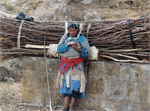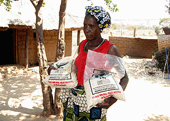Social Watch news
Published on Fri, 2014-07-18 10:59
The Palestinian NGOs Network "PNGO" addresses Mr John Gatt-Rutter, EU Representative to Palestine, while Israeli occupation offensive against the Palestinian people continue and in the light of the occupation's aerial, naval and artillery bombardment of the Palestinian houses and civil society organizations in the Gaza Strip, that left more than two hundred martyrs most of whom are children, women and elders and displaced hundreds of families leaving them with a shelter after destroying their houses, as well as destroyed agricultural lands, fishing boats, factories, and civil society organizations. |
Published on Fri, 2014-07-18 09:44
Many voices have recently alerted to the impacts of the rulings by the US courts on Argentina’s ongoing dispute with a small minority of its creditors. Far from staying confined to Argentina, the decisions will have negative consequences on global financial stability have warned the International Monetary Fund, countries such as France, Mexico, Brazil and the US State Department, as well as economic analysts and civil society organizations. In a recent statement human rights organizations are now calling on governments to consider the worldwide human rights impacts of this decision. |
Published on Fri, 2014-07-18 09:18
Development aid is being redefined. Before the new UN Development Goals (Post-2015 Agenda) can be determined, the industrialized countries of the OECD wish to redefine which financial flows count as development aid. The Development Assistance Committee (DAC) of the OECD has been measuring financial flows from its members to developing countries since the 1960s. The data, compiled every year, provides information about which donor country invests how much in which developing country and in what development sector. In essence, all grants (see glossary below) and concessional loans that go towards the economic and social development are recognized as Official Development Assistance (ODA). In 1970, the United Nations General Assembly agreed for the first time that industrialized countries would earmark 0.7% of their annual gross national income as ODA. This goal has been repeatedly reaffirmed, but so far has been attained by just five of the 28 DAC donor countries (Denmark, Luxembourg, Norway, Sweden and the United Kingdom). |
Published on Tue, 2014-07-15 10:19
The United Nations is on the verge of releasing a new set of Sustainable Development Goals (SDGs) – perhaps 17 or more – to replace the eight Millennium Development Goals (MDGs) which will run out by the end of 2015. The proposed new SDGs, which will make amends for the shortcomings of the MDGs, will be an integral part of the U.N.’s post-2015 development agenda which, among other things, seeks to eradicate extreme poverty and hunger from the face of the earth by 2030. |
Published on Sat, 2014-07-12 00:00
Silence about the painful developments in Gaza is not acceptable anymore. The daily violations of international law and human rights and the dangerous escalation that has been taking place during the last three days in the Strip qualify as war crimes and crimes against humanity, even genocide. Since the hostile military operations against the Gaza Strip were launched; that is, for the last three days, more than 100 Palestinian martyrs have fallen and more than 700 others were wounded, in addition to the comprehensive destruction of properties and infrastructures. Israel ignores all international standards applicable in armed conflicts by directly targeting civilians, implementing collective punishment by imposing economic siege, and banning the entry of medical and relief materials. Also, the Israeli military machine, which is threatening a land aggression, does not take into any consideration the principle of proportionality and to eschew collateral damage. |
Published on Fri, 2014-07-11 12:09
During the last meeting of Heads of State and Government of Brazil, Russia, India, China and South Africa (BRICS Summit), held in Durban, South Africa, in 2013, BRICS’ leaders announced the decision to establish, already in 2014, the BRICS Development Bank. For the next BRICS summit, to take place in the city of Fortaleza, Brazil, on July 14, 15 and 16, they announced signing of a formal agreement on this Bank, but there are still a lot of expectations and doubts about the basis on which it will be constituted. |
Published on Fri, 2014-07-11 11:56
Palestinian Non-Governmental Organizations Network (PNGO) calls on the international community and the Secretary-General of the United Nations Ban Ki-Moon to provide an immediate international protection to the Palestinian people and exert immediate and urgent efforts to stop the Israeli occupation's aggression in the Gaza Strip. PNGO warns that the Israeli occupation totally ignores the international conventions and treaties including the Fourth Geneva Convention by committing horrible crimes against the Palestinian civilians by targeting their houses using war jets, artilleries and gunboats in the light of the Israeli tight siege on the Gaza Strip. |
Published on Wed, 2014-07-09 15:54
The 48 least developed countries (LDCs), described as the poorest of the world’s poor, want to be an integral part of the U.N.’s post-2015 development agenda currently under discussion. An Open-ended Working Group (OWG), which will continue its 13th round of negotiations next week, is expected to come up with a set of new Sustainable Development Goals (SDGs) to replace the eight Millennium Development Goals (MDGs) which reach their deadline by the end of next year. "The neo-liberal policies that have failed LDCs will continue to drive the agenda." -- Demba Dembele |
Published on Tue, 2014-07-08 14:45
With 17 months before the Millennium Development Goals (MDGs) reach their targets by the December 2015 deadline, the United Nations is trumpeting its limited successes – but with guarded optimism. “Global poverty has been halved five years ahead of the 2015 time frame,” says Secretary-General Ban Ki-moon in the latest status report released Monday. "Unfortunately, the trend in the U.N. secretary-general's office and many developed countries is to place hopes in private corporations and 'multi-stakeholder partnerships' that fudge the massive problems caused by many corporations." -- Yoke Ling Chee |
Published on Thu, 2014-07-03 19:35
Last week, human rights advocates had a reason to celebrate, as the United Nations Human Rights Council, meeting in Geneva, decided on June 26, 2014 to establish an open-ended intergovernmental working group whose mandate is to elaborate a legally binding instrument on transnational corporations and other business enterprises with respect to human rights. Not only is the resolution a big achievement in itself. It is also a powerful message of hope to all those in the trenches of facing human rights abuses as a result of the unchecked growth of borderless corporate influence. It proves that people organized across borders, and their political action, still can make a difference. The resolution was achieved against big odds, and even as companies exerted pressure to knock it down, directly and through their influence on important governments. In fact, many governments did not withstand the pressure and voted against, such as the case of United States and many European countries in the Council, while others preferred to abstain. |
SUSCRIBE TO OUR NEWSLETTER








